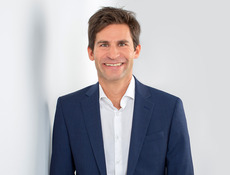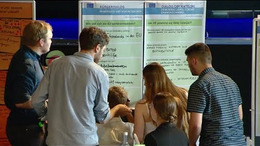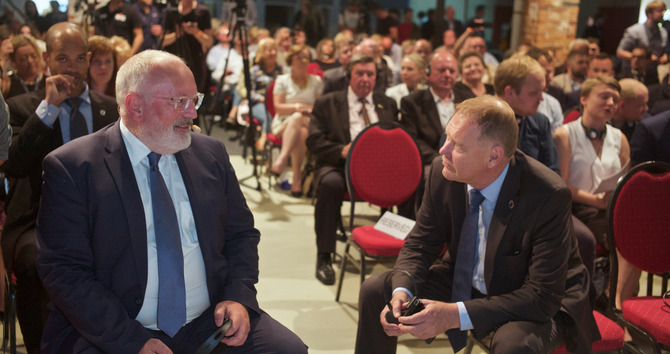![[Translate to English:] Kartenabstimmung mit Frans Timmermanns und Elzbieta Polak](/fileadmin/files/_processed_/4/1/csm_180007320142_Titelfoto_Timmermans_Kartenabstimmung__L1020772_e548556d54.jpg)
Boris Bocheinski
Among Friends and Critics of the EU on the German-Polish Border
We recently hosted a citizens’ dialogue in Frankfurt (Oder), a city on the German-Polish border, organized in partnership with the Berlin-based Representation of the European Commission. Politicians, university-level students and citizens from Poland and Germany were asked to discuss their visions for the European Union.
“Europe must go the citizens, and not the other way around. Otherwise, it can’t work”: The opening statement of Aart De Geus, our chairman and CEO, set the appropriate framework for the European citizens’ dialogue on May 24. The event was held in the Kulturbahnhof Frankfurt (Oder), an old warehouse converted into a unique venue for cultural events. It brought politicians from the EU, regional and municipal levels together not only with German and Polish citizens, but also with students from both countries, so as to also give the latter an opportunity to contribute their points of view and voices.
What holds Europe together? What do people expect from the EU? Do we need more or less Europe? These questions took center stage during the citizens’ dialogue. But before the guests could discuss these issues with Frans Timmermans (First Vice-President of the European Commission), Elżbieta Polak (Marshal of Lubusz Voivodeship in Poland) and Stefan Ludwig (Minister for European Affairs of the Federal State of Brandenburg), the agenda included an interactive workshop in the afternoon for the German and Polish students invited to the event. During the workshop, questions about and solutions to the EU’s pressing challenges were jointly formulated and then presented to the politicians to discuss during the citizens’ dialogue. The students were particularly interested in issues like common data protection rules, the social cohesion of Europe, and the establishment of a European unemployment fund.
Are there too few supporters of Europe, or are they just too quiet?
In the evening, the focus turned to the citizens’ dialogue held in a large plenary session. Before a sizeable audience of journalists and many participants from both countries, things quickly got to the point. As was very much in the spirit of a pan-European dialogue, the discussion was held in multiple languages, as countless members of the audience quickly asked – in Polish, German and also English – for an opportunity to speak. Many guests took part in the lively discussion in “buzz groups” or in open debates.
In the process, there was praise for the EU – but also some critical voices: Why does the EU want to initiate an infringement proceeding against Poland, and why does the European Parliament have so few rights? In response to such questions, Frans Timmermans repeatedly referred to the particularly challenging circumstances for the EU. “We are experiencing a fateful moment,” Timmermans said. “At a time when our trusted allies are increasingly going their own way and countries like China and Russia are trying to get individual states to form ties with themselves, we Europeans must not allow ourselves to become divided.” Challenges like migration, social rights of Europeans, or common data protection regulations, in particular, cannot be solved at the nation-state level alone, he added, but only if we speak with one voice.
The issue of heteronomy by Brussels was also touched upon. Ludwig, Brandenburg’s minister for European affairs, referred to the principle of subsidiarity, according to which everyone should perform precisely the tasks for which they can bring in the most competences – in other words, the European Union can do much, but not everything better than its Member States. Commission Timmermans, a Dutchman, added his thoughts, referring to the memory of the Iron Curtain and noting that the Poles – just like the former citizens of communist East Germany – enjoy countless freedoms today that were unthinkable for a long time, and that using the term “heteronomy” was therefore inappropriate.
As the event drew to a close, a Polish member of the audience asked Timmermans why there are so few pro-Europeans. In response, Timmermans said that he does not believe that pro-European are in the minority, but that they were definitely too quiet. The subsequent applause made it clear that he had struck the right tone that evening in Frankfurt (Oder).






